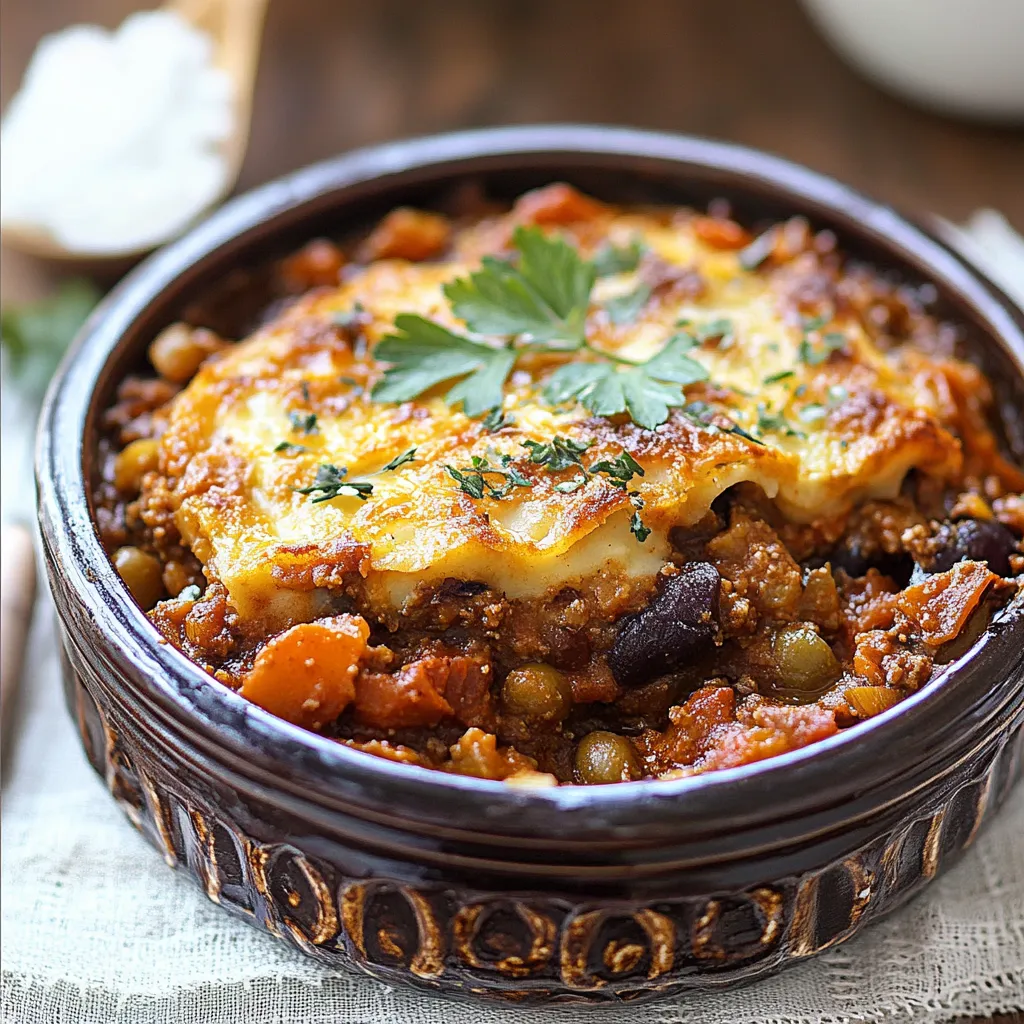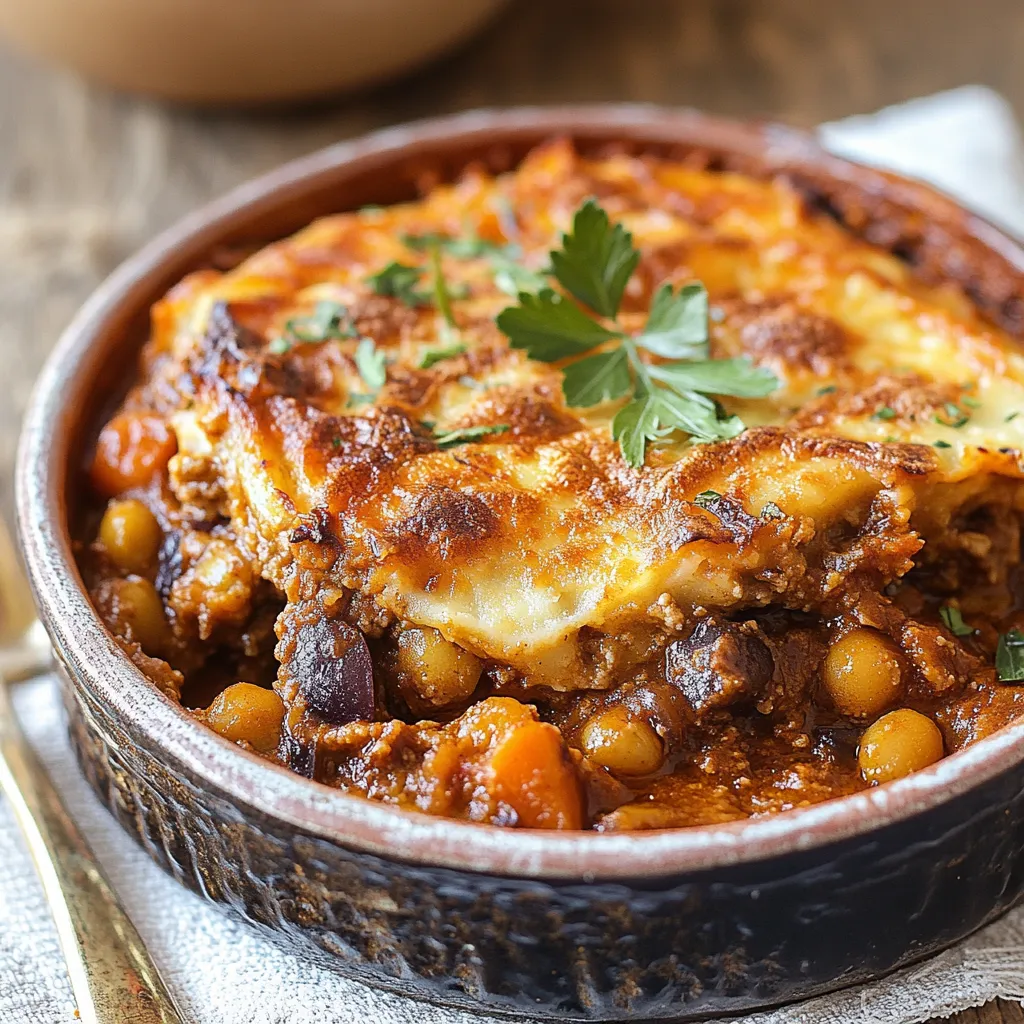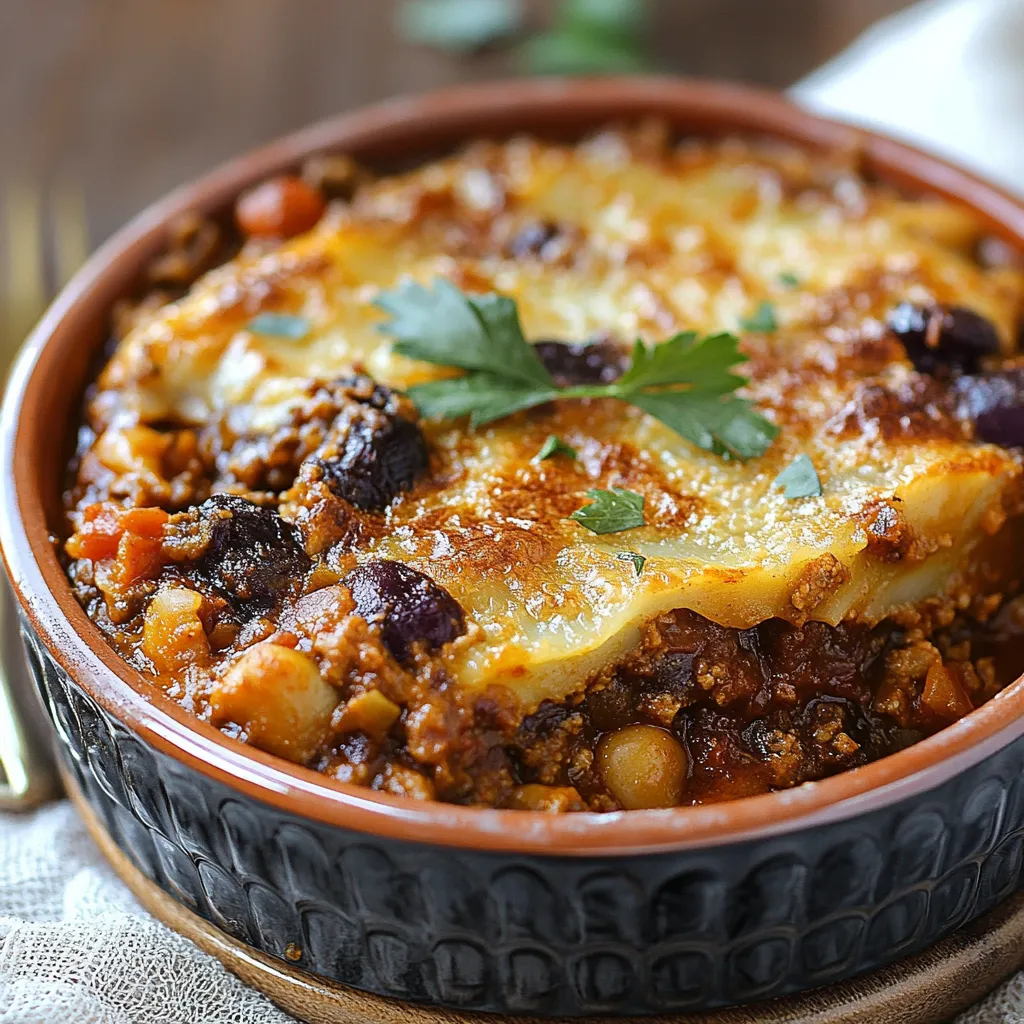 Pin it
Pin it
This Lebanese Moussaka (Maghmour) is a rich, smoky eggplant stew that has been a cornerstone of my family gatherings for generations. Unlike its Greek counterpart, this version is completely plant-based while delivering complex flavors that develop beautifully as it simmers.
I first learned to make this dish from my Lebanese neighbor who insisted the secret was patience when roasting the eggplants. Years later, her technique still brings my family running to the kitchen when they smell the aromatic spices wafting through our home.
Ingredients
- Eggplants: Choose firm eggplants with glossy skin and minimal blemishes for the best texture
- Yellow onion: Forms the aromatic base of the stew providing sweetness as it cooks down
- Garlic cloves: Fresh is essential here for that punchy flavor that defines Lebanese cuisine
- Fresh tomatoes: Ripe juicy tomatoes provide the backbone of the sauce look for ones that yield slightly to pressure
- Tomato paste: Adds concentrated umami depth and helps thicken the stew
- Chickpeas: Brings protein and heartiness making this a complete meal
- Cinnamon: A warming spice that elevates the dish with subtle sweetness
- Dried mint: The signature flavor that sets Lebanese Moussaka apart from other regional variations
- Olive oil: Use the best quality you can afford as its flavor shines through in the final dish
- Salt and pepper: For seasoning to taste
Step-by-Step Instructions
- Prepare the Eggplant:
- Preheat your oven to 400°F (200°C). Partially peel the eggplants leaving strips of skin intact which helps them maintain structure during cooking. Cut into generous 1inch chunks. Place on a baking sheet and drizzle liberally with olive oil, tossing with your hands to ensure every piece is coated. This oil is crucial not just for preventing sticking but for developing that signature smoky flavor.
- Roast the Eggplant:
- Arrange the eggplant pieces in a single layer and roast for 20—25 minutes. You want them golden brown on the outside and tender enough that a fork slides through easily. The caramelization that happens during this step is essential for the depth of flavor in the final dish.
- Prepare the Base:
- While the eggplant roasts, finely chop your onion and mince the garlic. Dice fresh tomatoes into small pieces. Heat 2 tablespoons of olive oil in a medium saucepan over medium heat and add the onions. Cook them for about 5 minutes until they become translucent and just begin to turn golden at the edges.
- Build the Flavors:
- Add the minced garlic to the onions and cook for just 1—2 minutes until fragrant but not browned as burnt garlic will impart bitterness. Immediately add the tomato paste and cinnamon, stirring constantly for about 30 seconds to toast the spices and caramelize the paste which intensifies the flavor profile dramatically.
- Create the Sauce:
- Add the chopped fresh tomatoes to the aromatic base, reduce heat to medium—low, stir well, and cover. Let this mixture simmer for at least 10 minutes, adding small amounts of water as needed to prevent sticking. The tomatoes should break down into a thick sauce with visible texture rather than a smooth puree.
 Pin it
Pin it
My grandmother always said the true test of a good Maghmour is whether you can still taste each individual ingredient while experiencing them as a harmonious whole. She would insist on serving this with a squeeze of lemon at the table which brightens all the flavors and cuts through the richness perfectly.
The Secret to Perfect Eggplant
The key to magnificent Maghmour lies in how you prepare the eggplant. Many recipes call for frying which while delicious can make the dish heavily oily. Roasting achieves that same caramelized flavor while using significantly less oil. For extra smokiness consider charring one eggplant directly over a gas flame before peeling and adding to the stew. This additional step takes just 5 minutes but adds remarkable depth to the final dish.
Make It Your Own
While traditional Maghmour sticks to a specific ingredient list, this dish welcomes thoughtful adaptations. For a spicier version add a pinch of Aleppo pepper or cayenne. If tomatoes aren&t in season substitute a 14oz can of quality diced tomatoes. Some northern Lebanese versions include a handful of pine nuts toasted and sprinkled over the top just before serving adding textural contrast and nutty flavor. During summer months I often add diced zucchini in the last 10 minutes of cooking for extra freshness.
Serving Traditions
In Lebanon Maghmour is typically enjoyed at room temperature or just slightly warm rather than piping hot which allows the flavors to fully develop. Serve it with warm pita bread for scooping or alongside a simple rice pilaf to absorb the flavorful sauce. A side of tangy Lebanese cucumber yogurt salad provides the perfect cooling counterpoint to the richness of the stew. For a complete mezze spread consider adding hummus tabbouleh and olives to create a feast worthy of any gathering.
 Pin it
Pin it
This dish is proof that simple ingredients treated with care can yield the most incredible results. It is always a crowd favorite and a staple in our home.
Frequently Asked Questions
- → How is Lebanese Moussaka different from Greek Moussaka?
Lebanese Moussaka (Maghmour) is entirely plant-based, featuring eggplant and chickpeas in a tomato sauce flavored with cinnamon and mint. Greek Moussaka contains layers of eggplant, meat (typically lamb), and is topped with a creamy béchamel sauce. The Lebanese version is lighter, vegan-friendly, and relies on herbs and spices for flavor rather than dairy and meat.
- → Can I prepare Lebanese Moussaka in advance?
Yes! Lebanese Moussaka actually improves in flavor when made ahead. Prepare it a day in advance and refrigerate in an airtight container. The flavors will develop and intensify overnight. Reheat gently on the stovetop, adding a splash of water if needed to maintain the stew consistency.
- → What can I serve with Lebanese Moussaka?
Lebanese Moussaka is traditionally served with warm Arabic bread or pita for scooping up the stew. It pairs beautifully with vermicelli rice, a simple cucumber and tomato salad, or tabbouleh. For a complete Lebanese spread, serve alongside hummus, baba ganoush, and pickled vegetables.
- → Can I use canned tomatoes instead of fresh?
Yes, you can substitute fresh tomatoes with a 14oz can of diced tomatoes. If using canned tomatoes, you may need to reduce the amount of water added to the stew since canned tomatoes contain more liquid. Adjust the consistency as you cook by adding water only if needed.
- → Is it necessary to peel the eggplant?
Partially peeling the eggplant as described in the recipe (leaving strips of skin) helps the eggplant maintain its shape during cooking while removing some of the potentially bitter skin. If you prefer, you can leave the skin on completely for added texture, or remove it entirely for a softer consistency.
- → Can I make this dish in a slow cooker?
Yes, this dish adapts well to slow cooking. Still roast the eggplant first as directed, then combine all ingredients in a slow cooker. Cook on low for 4-5 hours or high for 2-3 hours. This method allows the flavors to develop beautifully and requires minimal attention once ingredients are combined.
